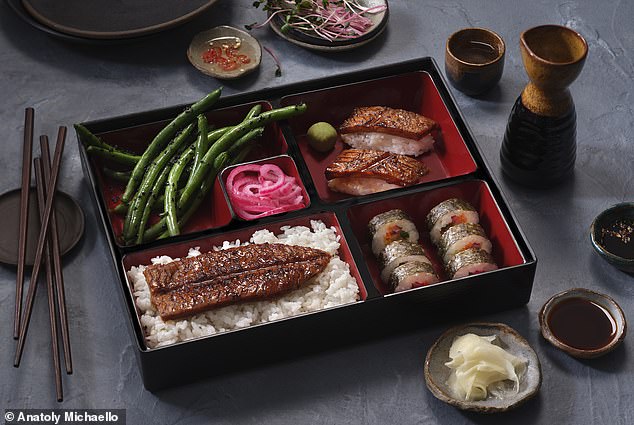Sushi of the future? Scientists unveil the first ever lab-grown EEL – and it looks and tastes just like the real thing
It’s a favorite dish among sushi lovers around the world, but your unagi nigiri might not come from the sea in the near future.
Instead, the eel could be grown in the laboratory.
The Japanese eel, or unagi, is known for its rich flavor, but demand is so high that wild populations are now threatened with extinction.
By growing the delicacy from embryonic cells, Israeli startup Forsea Foods says it can offer the meat commercially as early as 2024 without harming fish stocks.
Roee Nir, CEO and co-founder of Forsea, says this will “provide consumers with a true seafood experience without further burdening aquatic life.”
It’s a staple dish for every sushi lover, but your unagi nigiri may not come from the sea in the near future. Instead, the eel could be grown in the laboratory (photo)

By growing the delicacy from embryonic cells, Israeli startup Forsea Foods says it can offer the meat commercially as early as 2024 without harming fish stocks
Mr Nir added: ‘Forsea is a pioneer in merging traditional, high-quality Asian cuisine with groundbreaking technology to create the world’s first cultured unagi.’
This is the first time eel has been created in a laboratory and could potentially tap into Japan’s booming market for the expensive meat.
Forsea Foods collaborated with chef Katsumi Kusomoto to create two traditional Japanese dishes using lab-grown meat.
Mr. Kusomoto created unagi kabayaki, marinated grilled eel with rice, and unagi nigiri, eel sushi.
These eel dishes were once a staple of restaurants throughout Japan, but environmental concerns have made them much less common.
Mr Kusumoto says: ‘Unagi is an enduring favorite in Japan, but its timeless appeal is influenced by a growing awareness among the Japanese population of the need to take a more sustainable approach.’
In 2000, Japan consumed 160,000 tons of eel, but that has now fallen by 80 percent.
Overfishing and habitat destruction have decimated the wild eel population, and as of 2018, freshwater eel has been listed as endangered on the IUCN Red List.
Eels are also extremely difficult to breed in captivity, creating a shortage that has caused prices to skyrocket.
According to the Tokyo Metropolitan Central Wholesale Market’s monthly and annual reports, market prices for a kilo of eel more than doubled from £12.30 (¥2,300) to £29.68 (¥5,553) between 2010 and 2023.
Restaurant prices, meanwhile, can reach £250 per kilo.

Forsea Foods has teamed up with chef Katsumi Kusomoto to create two traditional Japanese dishes (pictured) using lab-grown meat
In order to continue offering this traditional delicacy without further harming wild stocks, Forsea has developed a method of growing eel meat in the laboratory.
Most lab-grown meat is made by producing protein and fat cells separately and then combining them on a scaffold.
The scaffold provides structure to the cells and ensures that they acquire a shape and texture similar to natural meat.
However, this process is slow and requires the creation of additional scaffolding for the cells.
Forsea, meanwhile, claims to have developed a method that requires no scaffolding to mimic the texture of meat.
Instead, the company uses pluripotent stem cells to create “organoids,” essentially small miniaturized versions of 3D tissues.
These organoids can then organize themselves into tissues that contain both fat and protein.
Although the eel meet is currently a prototype, Forsea claims it is now ready to scale up this process and could be ready for commercial launch as early as 2025.
However, Forsea is not the first company to produce a seafood product from lab-grown cells.
In May last year, scientists from Israel’s Steakholder Foods unveiled the very first 3D-printed fish fillet.
The cells were grown in a lab to mimic a piece of grouper and printed in layers to create the familiar flaky texture.
However, it may be some time before you can enjoy lab-grown sushi or fish and chips, as Britain does not allow the sale of lab-grown meat.
In August, Israeli company Aleph Farms became the first to apply for regulatory approval to sell slabs of laboratory beef, but it could take two years for a response.
The government has promised to speed up regulations that would make it easier to approve new foods, but more details on this proposal are yet to emerge.

